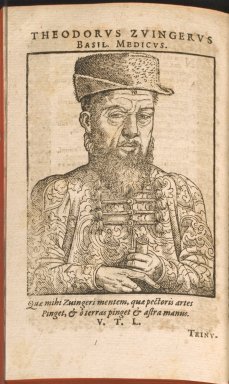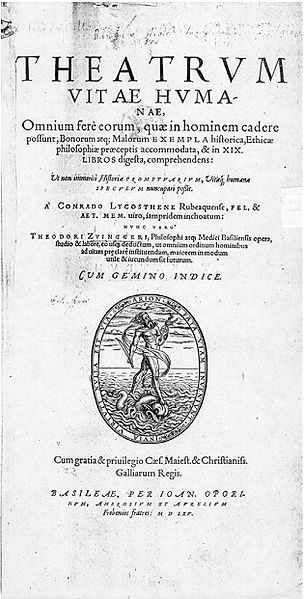<Back to Index>
- Physician and Humanist Scholar Theodor Zwinger the Elder, 1533
- Writer Ernest Christopher Dowson, 1867
- President of Venezuela Rómulo Ángel del Monte Carmelo Gallegos Freire, 1884
PAGE SPONSOR


Theodor Zwinger the Elder (August 2, 1533 – March 10, 1588) was a Swiss physician and humanist scholar. He made significant contributions to the emerging genres of reference and travel literature. He was the first distinguished representative of a prominent early modern Basel academic family.
Zwinger was the son of the furrier Leonhard Zwinger who had become Basel citizen in 1526. His mother was Christina Herbster, the sister of Johannes Oporinus (Herbster) the famed humanist printer. After Zwinger’s father’s death, Christina married the noted humanist Conrad Lycosthenes (Wolffhart).
Zwinger studied at universities in Basel, Lyon, and Paris before taking a doctorate in medicine at the University of Padua with Bassiano Landi, the successor of Johannes Baptista Montanus. In Paris he studied with the iconoclastic philosopher Petrus Ramus. He joined the faculty of the University of Basel as a member of the consilium facultatis medicae from 1559. At Basel he held successively chairs in Greek (1565), Ethics (1571), and finally theoretical medicine (1580). While originally hostile to Paracelsus, in his later career he took an interest in Paracelsian medical theory for which he experienced some hostility. He associated with Paracelsians such as Thomas Moffet and Petrus Severinus.
Zwinger was the editor of the early encyclopedia Theatrum Humanae Vitae (editions 1565, 1571, 1586, 1604). The work is considered "perhaps the most comprehensive collection of knowledge to be compiled by a single individual in the early modern period." He was able to draw on the knowledge base of his stepfather Conrad Lycosthenes in compiling the Theatrum Humanae Vitae.
Zwinger’s son, Jakob Zwinger, briefly served as his successor as editor of the Theatrum. His descendant Theodor Zwinger the Younger (1597 - 1654) was a prominent preacher and theology professor.